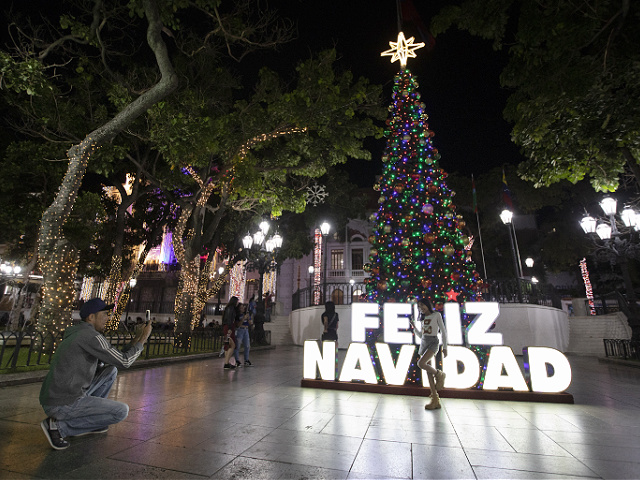The socialist regime of Venezuela began distributing on Thursday a “Christmas” stipend of 180 Venezuelan bolivars — or roughly $4.70 — to its citizens following dictator Nicolás Maduro’s orders to begin celebrating Christmas in October.
The “Venezuela in Christmas” stipend will be distributed to users of the regime’s Patria (“Fatherland”) platform, a system largely inspired by China’s social credit system that the ruling socialists built with the aid of China’s ZTE company to control the distribution of rationed food, fuel, and other “benefits.”
According to a post on the Fatherland platform’s website, distribution of the stipend “sent by our President Nicolás Maduro” will take place from October 10 to 19. Recipients of the socialist dictator’s “bonus” will receive a text message that reads, “In Venezuela, the magic of Christmas arrives in October. They will be beautiful days full of peace, happiness and security, of much brightness and joy.”
The Fatherland platform’s website cannot be normally accessed outside of Venezuela without the use of a tool such as a Virtual Private Network (VPN), but an archived copy of the post can be freely accessed here.
“In Venezuela, the magic of Christmas arrives in October. They will be beautiful days full of peace, happiness and security, of much brightness and joy,” a promotional image of the stipend featuring a smiling Maduro reads.
Maduro, after stealing yet another election in July, once more trampled upon Christmas traditions and commanded Venezuelans to celebrate Christmas early for the sixth year in a row. Socialist Christmas began this year two months before the start of Advent, a four-week period that Christians mark ahead of December 25, Christmas Day.
Maduro also used his superhero propaganda cartoon Súper Bigote to “celebrate” the early arrival of Christmas in Venezuela.
The dictator’s “generous” $4.70 October Christmas gift is far too little to have any meaningful impact on the nation’s impoverished population and is far from funding a full Christmas meal in the country for a single individual, let alone purchase gifts or cover other Christmas-related expenses.
Reports published by local outlets in September indicated that the price of a single hallaca, a traditional Christmas dish and one of the four parts of the full Venezuelan Christmas ensemble, hovers around $4-6 a piece in Caracas.
In addition to the “Christmas” gift, public sector workers reportedly began receiving the payment of their aguinaldo on the Fatherland platform. The aguinaldo is a Christmas bonus that Venezuelans receive that is typically worth two to three months of their wage, or more depending on the terms of their employment and their position on the payroll.
The head of the Venezuelan Federation of Teachers (FVM) reportedly told a local radio station that the first month of aguinaldo to public teachers will be worth 506 bolivars (roughly $13.40).
The socialist dictator claimed that he rescheduled Christmas as a form of “gratitude” for Venezuelans “reelecting” him in the fraudulent July 28 presidential election, which he insists he “won” despite growing evidence that suggests he was defeated in a landslide.
Critics have accused Maduro of using Christmas to distract from the brutal repression and hunting of dissidents, including the torturing of minors, that the dictator unleashed against protesters in the aftermath of the fraudulent election.
According to U.N. estimates, the regime’s repression left at least 25 dead and more than 2,400 arbitrary detentions, of which 70 are children ranging in ages from 14 to 17 who reportedly remain detained as of Friday.
Several social media users reportedly denounced at the start of October that officials from the regime’s SENIAT tax authority are imposing fines on commercial establishments that have not put up Christmas decorations in accordance with the dictator’s orders.
The local outlet Crónica Uno reported this week that private shopkeepers in the city of La Guaira have expressed their rejection of the forced Christmas decoration mandates during October under penalty of SENIAT fines. SENIAT officials reportedly visited several of the city’s commercial areas to ensure compliance with the dictator’s orders.
An individual who did not want to be identified for fear of reprisals told the outlet that the October Christmas decree will not increase his sales, “but I do not want to be fined when December is coming.”
